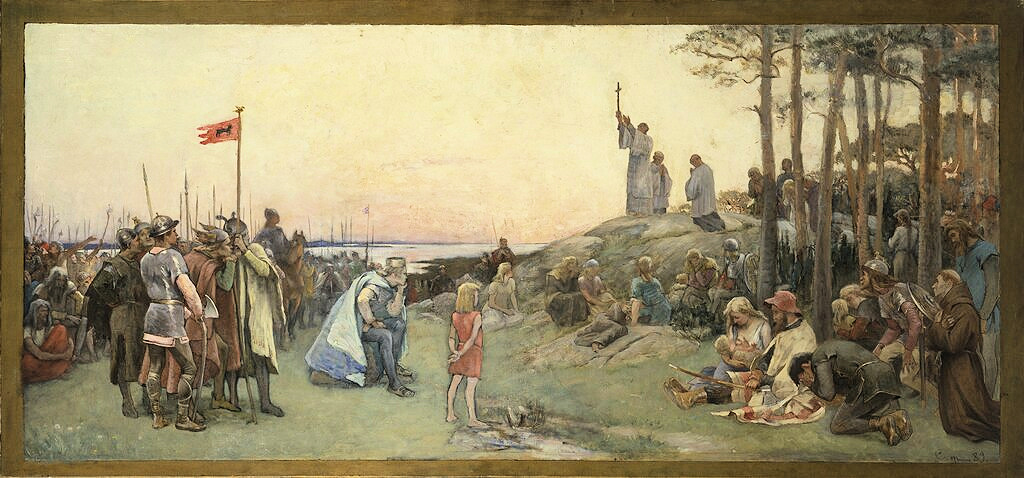
More classic art masterpieces used as illustrations
TL;DAR:
Ansgar, a ninth-century monk known as “The Apostle of the North,” dedicated his life to evangelizing the Vikings despite repeated setbacks and little visible success. His perseverance shows that true missionary success is measured by faithfulness to God’s call, not by immediate results.

Merciless villains. Bloodthirsty pillagers. Violent arsonists. Savage barbarians.
When used to describe an entire people group, those words sound awful. Yet, those words are often used to describe the Vikings, that Scandinavian people group that terrorized the rest of Europe for at least three centuries.
To go as a foreign missionary to people like that would take courage. It would take a strong sense of call. And, it would take a lot of dedication, especially if evangelistic results were meager or even nonexistent (which was the case). Indeed, dedication is something that certainly marked Ansgar1, a missionary whom many now call The Apostle to the North.
Born in 801 A.D. in what is now France, Ansgar became a Benedictine monk. A series of visions or dreams gave him a clear sense of a missionary call. So, three years later, he went north as the pioneer Christian missionary to Scandinavia (the area today we know as Denmark, Norway, and Sweden).
Over the next 30 years, the Vikings forced Ansgar out of Scandinavia at least twice. However, he saw those events only as temporary detours. Both times, dedication to his call had him soon returning to Viking territory. One fascinating bit of trivia about Ansgar is that his name apparently meant "spear of God." Was it just a coincidence that he was sent to warrior tribes?
Evangelistic work in Viking territory was not all that fruitful. So Ansgar tried several avenues of ministry, including education and health care. He paid ramson money to release people taken prisoner taken in Viking raids and campaigned against slavery while working to reduce the horrors of the slave trade. A contemporary of Ansgar wrote that he was "accustomed to working with his hands in the fields and in the forests and was able to endure long-continued fatigue and privation."
Eventually, through Ansgar's preaching ability and holy lifestyle, he did see a few people become interested in the Gospel. A key leader or two leaned toward converting, but no Christ-ward movement developed among the general populace. At Ansgar's death, the Vikings immediately lapsed back into paganism. Even though he had built a church building or two, no viable congregations existed in Viking territory when Ansgar passed away. Indeed, there is no record of even any lasting individual conversions. However, Ansgar had been called to the inhabitants of Scandinavia, and he dedicated his life to fulfilling that call.
More than a hundred years after Ansgar's death, many people in Scandinavia embraced Christ. One Viking country, Denmark, eventually became one of the first Protestant areas to become heavily involved in world evangelism. There was no hint, however, of that ever happening when Ansgar was toiling away seemingly fruitlessly.
Ansgar didn't have success in the way we sometimes measure success today. But he was dedicated. And that's the type of missionary God can use.
1*Note: Ansgar's name has also been spelled as Anskar, Anschar and Ansgarius.
-- Howard Culbertson, hculbert@snu.edu
Ansgar's life exemplifies the importance of a long-term point of view in world missions ministry. Despite few immediate results, Ansgar remained dedicated to his call to get the Gospel to the Vikings. Contemporary missionaries can learn from his perseverance, especially in contexts where responses to the Gospel come slowly. Success statistically isn't always immediate, but faithfulness to the call and commitment to sharing God's love matter. Like Ansgar, missionaries today must sometimes trust that their labor will bear fruit in due time, even if they don't see it in their lifetimes.
To be sure, Ansgar's historical context and specific challenges may differ from those encountered by modern cross-cultural missionaries. However, his life and work offer good insights and principles. By embracing adaptability, commitment, a holistic approach, relational ministry, and unwavering dependence on God, missionaries today can engage unreached people and advance the spread of the Gospel worldwide.
"The missionaries of old did not often get to realize the contributions that they made, and yet, they were greatly motivated. Why is this, and what will it take to cause us to again become burdened for the world?" -- Christi V., Nazarene Bible College student
More 500-word mini-essays in the "Doing missions well" series published in Engage magazine
Interesting factoid: There is a crater on the moon named after Ansgar. It uses the Latinized form of his name: Ansgarius.